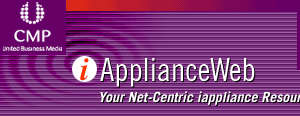



 |
 |
|
|
 |

|
||
|
|
|
|
|||

|
Microsoft falls to Java in bid to control digital cable APIsBy SAN MATEO, Calif. Microsoft Corp.'s well-funded and aggressive drive to own the application programming interfaces for interactive TV hit a wall Tuesday (Nov. 13) when a major U.S. cable organization embraced the Java TV API-based Multimedia Home Platform (MHP), developed by Europe's Digital Video Broadcast (DVB) initiative, as the middleware platform for advanced OpenCable digital set-top boxes. The announcement by consortium Cable Television Laboratories Inc., or CableLabs, is expected to end an industry battle engaged back in 1997 over whether to implement Java Virtual Machines (JVMs) on digital set-tops. Microsoft had flexed every available muscle in its bid for a lead role in bringing interactive technology to cable. But it failed to convince U.S. cable operators and set-top makers that Java posed too many risks, in both licensing terms and the aggressive system designs required for the Java TV API. The DVB pact puts the U.S. cable industry in lockstep with its European counterpart "on intellectual-property [IP] issues, development of test suites and implementation of set-top boxes," said Richard Green, president and chief executive officer of CableLabs. "This means reduced risks for manufacturers." With interest in developing MHP-based applications already growing outside the United States, "many more applications will become available for the U.S. cable industry," said Michelle Abraham, senior analyst for multimedia at Cahners In-Stat Group. Indeed, the deal should help pique software developers' interest in turning out more interactive content for cable. In the absence of a common platform, and of digital set-tops with sufficient memory and processing power, the software community to date has had scant impetus to develop the richer interactive content for which the cable industry has clamored. "This is wonderful news, because the global interoperability is a big concern for the content community," said Arthur Orduna, vice president of marketing at Canal+ Technologies, now part of Vivendi/Universal Group. MHP is a set of common APIs that promises an operating system-independent, level playing field for both broadcasters and consumer electronics manufacturers. In theory, MHP-based terminals could access any program or service built on Java TV API-based platforms. Eventual access For the two-thirds of U.S. homes with cable TV, the move means eventual access to interactive digital applications via a set-top that implements a JVM, Java TV and personal TV specifications. Bill Sheppard, group business-development manager for digital TV at Sun Microsystems Inc., said 8 Mbytes of flash, 16 Mbytes of DRAM and 100 Mips of CPU processing power will be sufficient to build an MHP-compliant set-top box for running Java applications. The big change in CableLabs' latest announcement is the cable industry's determination that "Java will become a dominant piece of technology within OCAP," or the OpenCable Application Platform, said Sheppard. The platform had always tapped the Java TV API for the execution engine, but plans for the presentation engine had included such Web-centric APIs as HTML and Flash. It should come as no surprise that Sun Microsystems considers the CableLabs decision a clear victory for Java. Certainly, the move advances Sun's plans to propagate Java services across user platforms, from wireless to telematics to cable. "Service providers interested in reaching consumers at home can also plan on getting to them in their cars or via their cell phones,"said Sheppard. Equally unsurprising is that Microsoft isn't calling the CableLabs decision a defeat. Paul Mitchell, director of content, standards and tools for Microsoft TV, argued that little has changed in the cable world. Although Microsoft's customers and the members of its developer program do not require MHP-compliant software, Mitchell said that "from a technology perspective, should our customers wish a Microsoft product that supports this [MHP] specification, we will deliver it." Microsoft was one of four companies assigned to author the OCAP specifications but it lost leverage in the API battle because of clashes with other companies over IP issues, according to several sources familiar with the talks. CableLabs had completed the OCAP specs by midyear but wound up deadlocked on IP questions largely related to Java. Microsoft had insisted it would not be treated fairly by Sun in licensing Java, and that Java's adoption would ultimately stifle innovation. "It is true that there were some issues that prevented the signing of the OCAP license by several contributors last summer," Microsoft TV's Mitchell said. He insisted that Microsoft had supported open development of the spec but added that "issues remain in the licensing agreements for MHP to date." Down but not out At least one third party is not counting Microsoft out of the interactive TV war. "Microsoft may pull out of the API battle, but they will certainly shift their focus to something else," said Ken Klaer, vice president and general manager for the international business unit at Scientific-Atlanta. "Never count Microsoft out." CableLabs turned to DVB for help in resolving its IP problems, since the European group had tackled similar questions. Aligning the OCAP spec with DVB's MHP will allow DVB and CableLabs to collaborate on the IP front. The two groups hope to establish an independent licensing authority through which all rights can be pooled, offering a one-stop IP licensing shop for OEMs, similar to MPEG licensing via MPEG L.A. Today, OEMs that need to build OCAP-compliant set-tops can either go to Sun or to CableLabs for the Java technologies necessary to build boxes. "They can get a license from us, build their own JVM and go through our compliance suites and branding," said Sheppard. Or they can go to CableLabs which has already licensed Java from Sun and get the JVM from non-branded clone vendors. |
|
||||||||

Terms and Conditions Privacy Statement |
||||||||||